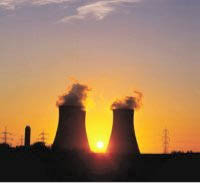Russia to seek U.S. court decision to lift curbs on Russian uranium exports
Speaking at a press conference in New York last Sunday, the head of the Russian Atomic Agency, Sergei Kirienko, said that Russia and the U.S. completely shared the views as to the development of nuclear power industry. “We may have different viewpoints with regard to tactics,” said Kirienko. He met with the heads of twenty U.S. energy companies during his three-day visit to the U.S. Kirienko also stated that Russia was set to seek a U.S. court decision in order to lift discriminating curbs on the supply of materials and services of the Russian atomic industry.

“Both countries realize that an energy crisis is coming. Therefore, it would be impossible to overcome the crisis and guarantee sustainable energy security of the world without developing atomic energy in the next 30-40 years. New countries should be given access to cheap atomic energy. On the other hand, we should ensure that the nonproliferation treaty is observed by all countries,” Kirienko was quoted as saying by ITAR-TASS news agency. Kirienko pointed out that the fulfillment of the task concerned the development of new technologies used in four-generation nuclear reactors and equipment for recycling waste products. The fulfillment of the task also had to do with such innovational solutions as high-speed high-temperature reactors capable of destroying stocks of nuclear waste and weapons-grade nuclear materials. New reactors are a must in terms of further progress towards new sources of energy e.g. thermonuclear and hydrogen power stations.
Russia and the United States have big plans, said Kirienko. However, it is important to remove obstacles on the road so that progress can be made. “Cooperation in the area of atomic energy development is in the interest of both countries. Maintaining the curbs is a legacy of the past, today it contradicts logic and feasibility, it’s totally unmotivated, by and large,” said Kirienko. Russia is ready to seek a U.S. court decision to lift discriminating curbs on the supply of materials and services of the Russian atomic industry to the U.S. market. According to Kirienko, the parties have worked out the “technology to lift the curbs.” In other words, mutual steps should be taken by Russian and U.S. companies in accordance with the U.S. law protecting American producers. “Such actions may include all legal measures aimed at settling issues by means of negotiation. At the same time, we are ready to lodge claims to U.S. courts. There’s a high probability that not only the Russian party may lodge claims. U.S. companies may lodge such claims too should those companies believe their rights are violated if the U.S. government prevents them from buying Russian products and services on the open market. I believe this isextremely important, andtherefore I’ve very much pleased with the results of the negotiations in New York,” said Kirienko. A number of meetings between Kirienko and members of the U.S. administration and Congress were scheduled for Monday and Tuesday. Kirienko is expected push for creating normal conditions for Russia-U.S. cooperation in the nuclear power industry.
American partners realize the importance of cooperation too. Following the negotiations with the head of the Russian atomic agency, Vice-President of the energy company Pacific Gas and Electric Corporation James Tramuta said that “U.S. Department of Commerce should understand that American companies and American consumers wish to deal directly with Tekhnosnabeksport (a Russian company that supplies services to U.S. market under the HEU-LEU (highly enriched weapons-grade uranium – low-enriched uranium) 1994 agreement. It would be in our common interests. We would also like to see the Department of Commerce taking into consideration a recent court decision with regard to the international trade. The decision specifically defines the Isotopes Fission Unit as a service, not as a commodity.” In view of the decision, uranium enrichment is a service and therefore the antidumping investigation law does not apply to it.
Sergei Kirienko will take part in the annual Forum of Russian and U.S. Business Elite organized by RAND Corporation.
The reporters asked the head of the Russian atomic agency whether the current cooling in the relations between two countries had a negative impact on Russia-U.S. cooperation in the nuclear power industry. “It would be utterly unwise to build a link between current bilateral relations and the nuclear energy development project in which both parties show interest,” answered Kirienko. He stressed the importance of a long-term nature of nuclear power industry. “All those heated political discussions will be forgotten in five-year time. Today we’re laying the foundations of the nuclear security development projects that are meant for the future,” said Kirienko.
Kirienko said that after meeting with the heads of twenty U.S. energy companies in New York he had no doubts that the U.S. companies would really like to see Russian nuclear fuel and services gain open access to the U.S. market. The Russia-U.S. cooperation for the development of atomic power industry is not a commodity. Parties resort to bargaining when one party is more interested in getting something than the other party. "Following my talks with the U.S. energy companies, I have no doubts that the both parties are equally interested in reaching the agreement so there’s no point in bargaining here,” said Kirienko.
Strana
Translated by Guerman Grachev
Pravda.Ru
Subscribe to Pravda.Ru Telegram channel, Facebook, RSS!


